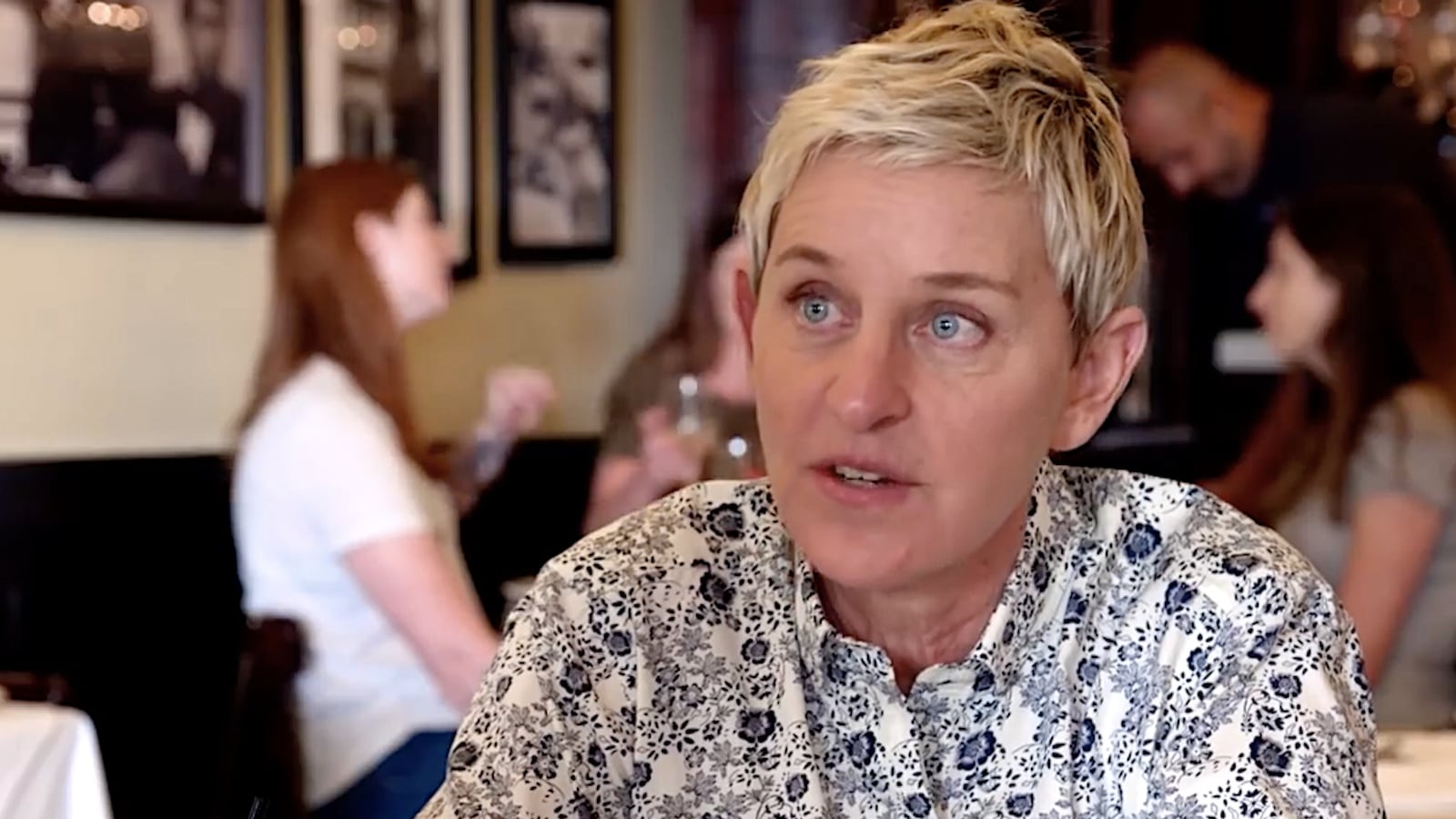Ellen DeGeneres rarely lets the darkness in on her long-running daytime talk show. But that rarely seen side of the comedian and host is on full display in her time with Jerry Seinfeld on Comedians in Cars Getting Coffee on Netflix, despite the bright yellow 1977 Toyota FJ40 Land Cruiser at the center of the episode.
Seinfeld picked that “giant toy” of a car for his guest because it’s “approachable” and “no-nonsense,” just like her. But as funny as DeGeneres—and at times the episode, which streams July 6—is, the host likely didn’t realize how real things would get in their conversations, both on the road and over coffee in her neighborhood of Montecito, California.
Asked by Seinfeld if she ever could have predicted the success of her talk show, DeGeneres laughs and says, “I still don’t get it. I still don’t get my appeal,” adding, “I just go along with it.”
DeGeneres tells Seinfeld about the very first bit she did on stage at a charity fundraiser. She got laughs and realized she might actually have a career in comedy ahead of her. “And then the thing that changed my life, of course, is my girlfriend was killed in a car accident,” she says, sharing a story she also told Dax Shepard on his Armchair Expert podcast earlier this year. “And I just kept thinking, why is this 23-year-old girl that I loved just gone?”
As she was grieving, DeGeneres found herself wishing that she could call up God and ask these questions. “Because people pray all the time,” she says, “but wouldn’t it be amazing if you could have a connection?” Right then, she started writing out the bit and said to herself, “I’m going to do this on Johnny Carson and I’m going to be the first woman in history of the show to be called over to sit down with Johnny Carson.”
Five years later, that’s exactly what happened.
“That’s very clever and very fresh,” Carson told her when she sat down on his couch that November night in 1986. “It’s always tougher for a woman to do comedy,” he added, because audiences “will accept a little more aggression from men for some reason.” He ended by saying DeGeneres had an “open invitation” to come back on The Tonight Show anytime.
DeGeneres tells Seinfeld that becoming famous was always “really important” to her. “And that intention was set early on,” she says, noting that since she was raised in the Christian Science religion, “nobody really acknowledged pain” and “there was very little expression of emotions or depth or love.” With her comedy, and especially through her feel-good show, DeGeneres has really sprinted in the opposite direction of that sensibility.
With rare exceptions—like, for instance, her tough commentary about police shootings with CNN’s Van Jones this past April—DeGeneres almost never lets viewers see through her sunny disposition. But with Seinfeld, she reveals just how troubled she is about the state of the world.
“The world is such a scary place right now, in so many ways,” she says. “You have children and there’s North Korea and there’s fires, there’s storms. It just overwhelms me with dread.” When she asks Seinfeld if he “goes to those places” in his head, he immediately replies, “No.”
“You know, my attitude is that each generation kind of gets this thing dumped in your lap to deal with,” Seinfeld says. Perhaps given her own struggles, both personally and professionally, DeGeneres just can’t look at it that way.
“When I lost my sitcom, I didn’t work for three years solid,” she says of her ABC sitcom, which was canceled not long after her character came out as gay on the show. During that period, DeGeneres says she was living in Ojai, California, feeling “bitter and sad and angry” about what happened. “How did this change everything just by me being honest and saying I’m gay?” she wondered. “Why is this such a shock to people? And why is it such a big deal?”
When DeGeneres finally returned to the road to perform stand-up, 90 percent of her audience was gay. “All the gay people really thought I was doing some sort of gay pride tour,” she says. “So I was making fun of the fact that I was their leader now. I was like, ‘I’m not your leader. I’m not anybody’s leader.’”
And yet she has certainly been a pioneer for LGBTQ Americans, rising to a level of popularity as an openly gay figure in pop culture that was practically unheard of before she came along. According to a 2015 study, no one was more influential than DeGeneres in changing American attitudes about gay rights.
DeGeneres married actress Portia de Rossi in 2008, before same-sex marriage became the law of the land nationwide. But they decided not to have children.
“I thought I would have kids,” she tells Seinfeld, himself a father of three. “When I was younger, I really wanted to have a baby. I thought I would adopt. I never thought I would have a baby, but I thought I’d want kids.” When Seinfeld tells her she “still could,” DeGeneres replies, “No, Portia doesn’t want kids. She doesn’t like the squealing when they’re in a pool, that high-pitched squealing of joy that they have.”
It’s personal riffs like that one, more than the topical monologue jokes she delivers each weekday or even the prank she plays on Seinfeld at the end of the episode, that point to the type of material we might see from her when she debuts her first stand-up special in 15 years on Netflix later this year.
Perhaps DeGeneres will even return to her original premise of that phone call with God and see what he (or she) has to say about all the terrible things happening in the world today.






